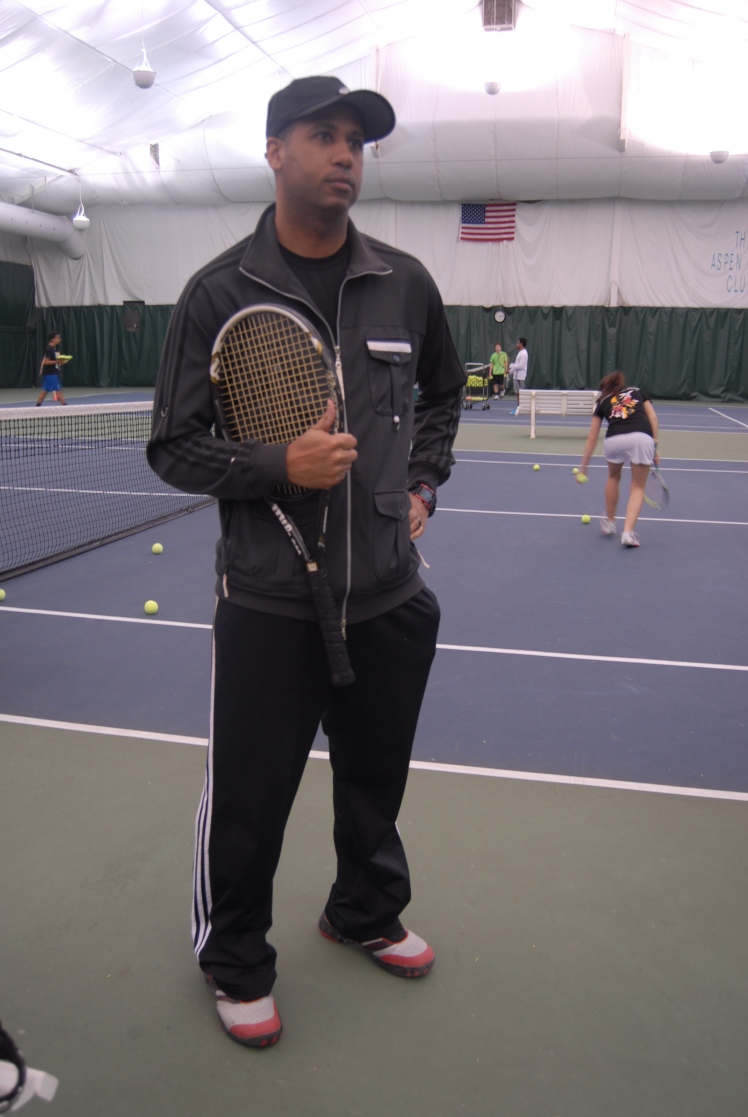Note: This is the first of an occasional profile of people of color who love the sport of tennis, ranging from those who earn a living from it to those who just enjoy playing on weekends.
The Scott File
- Full name: Terrance Gregory Scott
- Birthplace: Philadelphia
- High School: Roxborough High School
- College: University of Maryland Eastern Shore
- Current residence: Baltimore, Md.
- Favorite stroke: Forehand. “It’s my killer shot!”
Many tennis followers might think of Terrance Scott as an anomaly.
He is a black man who grew up in inner-city Philadelphia playing football, basketball and tennis. But he chose to concentrate on tennis.
“I was around 12-13 years old when I had to make a decision on which sport I wanted to put all my energies into,” Scott told me during a recent interview. “Tennis was the one sport I really didn’t have to work hard at to be good at. So I figured if I actually practiced and trained and put some time in, I could actually do something great with it.”

Scott has reaped some hefty rewards from that kind of reasoning.
The top prize so far is his current job as tennis director at the Aspen Hill Club in Silver Spring, Md., the first African American to serve in that capacity.
The soft-spoken Philadelphian is among scores of black tennis pros who have carved out a successful niche as teachers, coaches or players on the lower-level circuit. They operate behind the scene, so to speak, away from the glare and glamor of the world tour.
For Scott, the payoff from his decision to focus on tennis began with a four-year scholarship to the University of Maryland Eastern Shore, where he earned a business degree in marketing. Afterward, he returned to Philly where he began teaching tennis and coaching junior players at the Legacy Youth Tennis and Education Center.
The center, formerly known as the Arthur Ashe Youth Tennis and Education Center, is where Scott honed his skills as a youngster. It is one of the United States Tennis Association’s regional training sites.
In mid-2014, Scott was hired by the Aspen Hill Club to be its tennis director.
When asked what stood out about Scott among the applicants, AHC General Manager Danielle Bouchard cited several personal traits and his professional track record.
“His personality and demeanor are just lovely,” Bouchard said, “and the experience he came to the table with added to how he presented himself. He had all the right qualities.”
Scott credits his experience at the Arthur Ashe center for the attributes that impressed Bouchard. He adds that tennis helps one develop lifelong coping and problem-solving skills.
“It teaches you a lot,” he said, “both on and off the court — integrity, honesty, etiquette, discipline, work ethic.”
As for his own teaching philosophy, Scott says he emphasizes an all-court game.
“I focus on teaching tennis from the ground up,” he said, “making sure players are using the proper footwork, are on balance and using the proper grip with excellent technique. I also try to instill a dominating personality when playing matches.”
Unlike many urban kids, Scott said he had plenty of tennis role models early in life, beginning with his dad, who worked with young substance abusers. He and his brother would tag along on their bicycles whenever his dad went to the courts at Awbury Park in Philadelphia’s Germantown section.
There, they met a host of black professionals playing tennis. Among them was Dr. Franklyn Scott (no relation), a dentist who is the current president of the American Tennis Association, the black counterpart to the USTA.
“They were a huge influence on me,” Scott said, “not only in tennis but in life.”
That is the kind of nurturing environment needed to develop more promising tennis players in the nation’s impoverished neighborhoods. That, along with financial support and the fortitude to withstand the heckling from homies who consider tennis to be a sport for wimps.
“The biggest challenge for inner-city kids is gaining courage to think outside the box, to buck peer pressure,” Scott told me. “After football practice, I would go and hit some tennis balls. I didn’t care about what my friends said.”
That’s great, Scott!
###

Great column, Larry! It’s like you never left the newsroom! One of best to date!!
Sent from my iPhone
>
LikeLike
Thanks, my brother. I’m enjoying myself.
LikeLike
You can register for the Arthur Lloyd Johnson tournament on Tennislink.com or on our website at westlouisvilletennis.com
LikeLike
Growing up on the South Side of Chicago. I thought I would be heckled as a Tennis Player. I was surprised that it never happened. Most people thought it was cool that I played tennis…
LikeLike